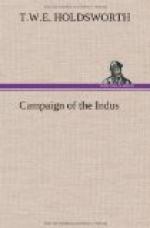with us, lightly equipped, the result would have been
very different. But, unfortunately, the only
time during nearly the whole campaign when cavalry
would have been of important service to us we were
without them. However, very little blood is ever
shed in desultory affairs of this sort, and they only
wounded about three or four of our men; and at one
place, a party of them coming unexpectedly upon the
reserve of the skirmishers, two sections opened a fire
upon them, emptied a few saddles, and sent the rest
flying. We with the main body had a very good
view of the whole affair, and a very animating scene
it was. Our road had hitherto lain through a
valley, about four miles broad; but when within about
three miles and a half from Kelat, it takes a sudden
turn to the right, and leads, for the next mile and
a half, through a narrow and straight pass, after
penetrating which, and arriving at the debouche, the
fortress of Kelat appeared before us, frowning defiance.
The first sight of it had certainly a very pretty
effect: the sun had just burst out, and was lighting
the half-cultivated valley beneath us, interspersed
with fields, gardens, ruinous mosques, houses, &c.;
while Kelat, being under the lee of some high hills,
was still in the shade; so that, while all around
presented a smiling and inviting appearance, as if
hailing our approach with gladness, the fortress above
seemed to maintain a dark and gloomy reserve, in high
contrast with the rest of the picture; nor was the
effect diminished when a thin cloud of smoke was seen
spouting forth and curling over its battlements, followed,
in a short interval, by the report of a large gun,
which came booming over the hills towards us.
“Hurrah! they have fired the first shot,”
was the exclamation of some of us, “and Kelat
is prize-money!” On looking more minutely at
it, however, it had rather an ugly appearance, and
seemed, at that distance, much more formidable than
Ghuzni did at the first view. We could only see
the citadel, which was much more commanding and difficult
of access than that of Ghuzni. The outworks,
however, as we afterwards found, were not half so strong;
these were, however, hidden from our view by two hills,
rather formidable in appearance, covering the approach
to the fortress, on each of which a redoubt was erected,
and which we could perceive covered with men.
Beneath us in the valley the advance companies were
seen pushing on to occupy the gardens and other inclosures,
while nearer the fort we could observe the body of
cavalry we had been before engaged with drawn up,
as if waiting our approach, under cover of the redoubts
on the hills. Half way down the road leading
into the valley was our Artillery, consisting of four
six-pounders, field-pieces belonging to the Shah, and
two nine-inch howitzers, with our Horse Artillery.
Here, also, was General Willshire and staff, who now
ordered one of the guns to open on the horsemen, in
order to cover the movements of the advance companies,




